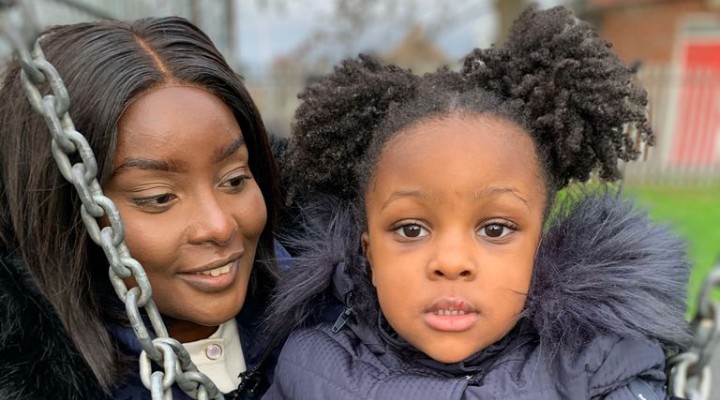

Tinuke Awe says she had to be rushed to hospital because she was dismissed and a life-threatening condition was diagnosed late.

Black women are at the highest risk of death during childbirth but the NHS has “no target to end it”, according to a government report.
The death rate for black women is five times higher than for white women, the Joint Committee on Human Rights document said.
“The NHS acknowledge and regret this disparity,” it said, concluding the government must introduce “a target to end the disparity in maternal mortality”.
Two women have talked to Sky News about their experience of bias during labour and birth.
Tinuke Awe said she wasn’t listened to, her pain was “dismissed” and her pre-eclampsia – a life threatening condition – was diagnosed very late which led to her being rushed to hospital.
“I just wasn’t taken seriously,” she said. “I think it’s ridiculous really. I feel like, yes, I’m black but I’m still a woman, I still bleed the same blood.
“Any assumptions made off the back of the colour of my skin, I just think it’s not on.”
Ms Awe describes being in a lot of pain and asking midwives in hospital to assess her.
“She didn’t check me over, she was very dismissive… I didn’t understand why she wasn’t listening,” she said.
“I’ll never forget the look of shock on her face when she did check – I had progressed really quickly. I was 8cm and almost ready to push.
“Then it was a swarm of doctors and midwives – ‘get her into the delivery suite, we need to get his baby out now’ – it was worrying and stressful.”
Ms Awe’s son is now nearly three years old, and she has a six-month-old baby girl, but she has never forgotten her first experience.
As a result, she and a friend set up Fivexmore, a campaign to try to overturn the mortality statistic for black women in childbirth in the UK.
Clo Abe, who helps run the campaign, stresses it is still relatively safe for all women to give birth in the UK.
She explained that the reasons behind the figures are very complex and deep-rooted.
Ms Abe said “unconscious bias” plays a part in perpetuating “myths” that some believe “black women can take more pain, black women’s skin is tougher”.
Deborah Lola said her first pregnancy was traumatising.
Her baby daughter, Grace, nearly died during childbirth and Ms Lola said she felt she was not taken seriously by health professionals.
“It was a terrible time. It was really frightening,” she said.
“Every time I stood up I was bleeding. It was only then that they went to call the registrar and said ‘we need to give birth to this baby now or this baby is going to die’.”
“It was devastating. It was horrible,” she said. “Knowing something is wrong, saying something is wrong, and then nothing is done – that was the worst part of it.”
Ms Lola said she was also neglected during her antenatal treatment in 2017.
Her daughter weighed significantly less than she should have quite early on in her pregnancy but she was given little attention.
She felt dismissed by health care professionals whilst in labour when she raised concerns about pain.
For the birth of her second child, Gabriel, Ms Lola chose to be around black health practitioners.
“As hard as it is to say, I needed to be around that to give me the confidence to know that I was going to be okay. Birth can be life or death,” she said.
She strongly believes her experience was related to her race and is calling for the government to offer more training to healthcare professionals on how they should treat mothers from different demographics.
Continuity of midwife care throughout pregnancy for black, Asian and minority ethnic groups was a target set out in January last year by the NHS.
Christine Ekechi, consultant obstetrician and gynaecologist at Imperial College London, explained that to tackle the inequality issue we must go back to the very start.
“Black women are twice and three times as likely to deliver a baby that is stillborn,” she said.
“They are more likely to deliver babies that are underweight, and we know once that inequity is embedded at birth that then will lead to a young female child more likely to have poorer health conditions, gynae conditions, that may make her at greater risk when pregnant.”
Dr Habib Naqvi MBE, director of the newly-launched NHS Race and Health Observatory, said racial inequality is global and systemwide and has been further exacerbated by the pandemic.
“We’re all too familiar with different rates of cancer and cardiovascular disease and diabetes [for BAME people],” he said.
“COVID-19 has had and continues to have a disproportionate impact on BAME patients and healthcare staff.”
Source:- News sky

SPONSORED LINKS
[TRENDING SONG!!] Romani D-Fans – Bestie (Prod By Krizbeatz)
[TRENDING MIXTAPE!!] DJ Baddo – Bestie Unlimited Mix
[TRENDING SONG!!] TYSG Ft Bad Mz X Kendi Rozzi – Iyariya
INSTALL 9JAFLAVER MUSIC APP, STREAM, DOWNLOAD, AND PLAY MUSIC OFFLINE
CHECK OUT FUNNY PICTURE AND MEME HERE (CLICK HERE)
Chissom Anthony – Glory To God In The Highest [See Trending Gospel Song]
© 2014-2023 9jaflaver. All Rights Reserved.
About us | DMCA | Privacy Policy | Contact us
| Advertise| Request For Music | Terms Of Service
9jaflaver is not responsible for the content of external sites.